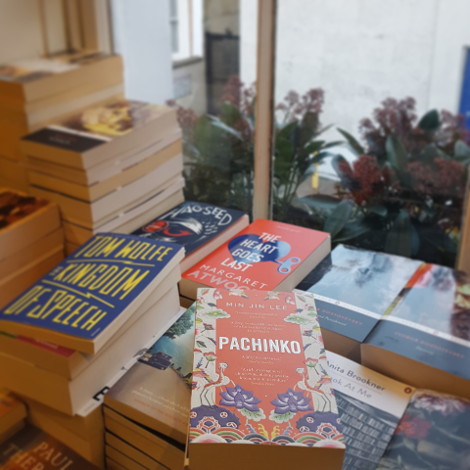
The first half was wonderful. I once thought this book would be one of my favourites. Beautifully written and I felt so close to all the characters! However, I was so disappointed by this book as it gets to the last. The book is divided into three parts. Part I was fantastic, Part II was OK, but Part III was almost like a different book.
前半はとっても良かった。読みながら、きっとお気に入りの一冊になるに違いないと思ったほど。登場人物に感情移入していました。でも、ラストが近づくにつれ、どんどん、どんどん悪くなっていく。3パートにわかれているこの一冊。パート1は最高だったのに、パート3ではもう違う本なんじゃないかな、と思ってしまいました。
The story was about Koreans who live in Japan, so-called zainichi Koreans. I think it’s so rare to find a book written about them in fiction and as well as not to become particularly anti-Japanese. It grasps concerns and history of their life very well from both Korean and Japanese viewpoints. It’s a sensitive topic.
これはいわゆる「在日」韓国人の物語。アンチ日本ではない本で、このテーマをきちんと扱っている本を探すのは難しいように感じています。この本は、彼らが抱えている問題を、韓国と日本どちらの視点も交え、美しい物語で語っているもの。センシティブなトピックですが、読みやすく、わかりやすいと思いました。
Another theme of this book was a sacrifice and suffering. The main character Sunja sacrificed a lot for her children. Sufferings of women are written in details.
もうひとつのテーマは犠牲と苦しみ。特に主人公のSunjaが母親として苦しむ姿を通して、女性の抱える生きる苦しみについて、詳細に書かれています。
It was very convincing and realistic at first, taught me a lot about their complex life. However, the story gets unfocused later on. There are so many minor characters who are minorities and suffering, sacrificing themselves in different reasons than being Koreans in Japan. Their part was always too short and gave me impressions that these were off topic. Bits of every kind of minorities in one book might help to cover all kinds of suffering. However, I thought it was too much. In part during the 80s, there were too many stereotypically ’80’S’ eccentric characters. It blurs the good atmosphere and feeling of understanding the difficulty of zainichi. Also, the character was almost giving a whole speech suggesting the insights of the author, how Japan needs to be changed. It is OK to make readers think about the problems and let them articulate their own opinions. But ‘teaching’ through the character is too ‘educational.’ I am not a fan of that type of book.
始めはとっても説得力がある物語で、複雑な背景の中生きる人々をよく描いていると思っていました。でも、後半に差し掛かると、物語の焦点が定まらなくなってきます。サブ・キャラ的な立ち位置の人々に焦点が移り、マイノリティ、在日としてだけではなく、様々な苦しみを抱える人の話に変遷していきます。それがきちんと描き切れていればいいのですが、なんだか中途半端にしかページ数も割かれておらず、次々に新しい人と新しい犠牲や苦しみが語られていくので、私は何を読んでいるのか、誰の物語なのかさっぱりわからなくなりました。特に80年代の描写はひどく、典型的80年代っぽい人が続々と登場。在日韓国人の複雑な心境や背景に、完全に感情移入していたので一気に興ざめ。しかも、日本社会の抱える問題に対して、おそらく筆者が伝えたかったのであろう考えを代弁するかのようなキャラクターまで登場。一気に説教くさくなりました。物語を通して、読み手に問題を考えさせること、意見を持たせるような働きをする本は良いけれど、どうするべきか、何が問題なのかを「教え込む」ような本は、ちょっと好みじゃないです。
Although the book describes well about characters (only in the first half), it lacked descriptions of scenery. I could not see the difference of Korea, Osaka, Tokyo etc. It could be anywhere. Unnatural usage of small Japanese words such as Hai, Honto, So desu, Maji etc were distracting. If it used properly, it could work as a spice in the book, making the characters more real, but for me, a native Japanese, it sounded so strange.
登場人物の描写が(前半だけは)素晴らしかった本作ですが、景色や情景の描写はあまりよくなかった。韓国、大阪、東京などの街が登場しますが、読みながら、景色が目に浮かぶようなことがなかったのが残念。また、「はい」「本当」「そうです」「まじ」等の簡単な日本語が多々使用されているのですが、それがどれも微妙。不自然に使われているので、私としてはちょっと残念でした。きっともっと上手く使えば、人物に深みが出て良いアクセントになるはずなのにな。
It was such ambitious and challenging book with a good theme and good scenes until it gets the last one third. I could give 4/5 for the first half! I personally am interested in the topic ever since I was an undergraduate, I myself have done a bit of research and interview. I am aware of the difficulty and familiar with the topic before start reading this book. That is why this book was just so disappointing. I even felt angry that it gets unfocused and strange at the end. Through reading the Acknowledgement, I felt the author’s passion to this topic of zainichi. Sooo mottainai! Maybe, the author needed a better editor, and it could have been a great book.
とっても挑戦的で、良いテーマ、良いシーンがある一冊なのに、後半三分の一がそれを台無しにしているような。前半だけなら 4/5 くらい好きな本なのに… 私は個人的に、在日の問題に興味を持っていたので、学部時代に少しリサーチやインタビューをした経験があります。この本を読む前から、ある程度の知識と問題意識がありました。だからこそ、この本が残念でならない。読み終えるころには怒りのほうが強かったくらいに。あとがきから、作者の情熱も感じられたから、もうほんと、もったいなくて!!!きっともっと良い編集者さんがついて、少し手直ししたらすごく良い一冊になったんだろうな。
2/5
(追記 2月25日)
よく本選びの参考にしている渡辺由佳里さんによるこの本のレビューがステキだったので紹介させてください。こちらの記事です。
私はアメリカでこの本がベストセラーになっているとは知らなかったのですが、移民の苦しみを語る本、というコンテクストでこの本を読み返すと、人気な理由がよくわかります。
この小説を読むときには、自分の国籍を忘れ去ってほしい。そして、ただの「読者」になってほしい。
そうすれば、彼らの苦難にひとりの人間として感情移入できるから。
やはり、物語の後半は主人公たちが置き去りに話が展開してしまっている、という印象が拭えないのですが… 由佳里さんがおっしゃっているように、「国籍」というもの、「移民」という存在を考えさせる良い本であることは間違いありません。
私好みの本ではなかったので、やはりお気に入り度を2/5から変更はしませんが、多くの人に手に取ってもらいたい一冊ではあるなと、改めて感じました。
Updated (25th Feb)
I came across with this review written by Yukari Watanabe-san.
I did not know that this book is the best seller in the United States. Considering the issue of the immigrants in the US, I can see the reasons why this book is that popular.
When you read this novel, I want you to forget your nationality. And I want you to be just a ‘reader’.
That way you can empathise them as a human being in their hardships.
Yukari Watanabe (translated by miki)
After all, I still think the book is not great as it gets to the end, the main characters and the main theme are left behind in the second half of the story. But, as Yukari-san is saying, there is no doubt that it is a good book that makes you think about ‘nationality’ and ‘immigrants.’
Since it was not my favourite book, I will not change my rating, 2/5, but it does not mean this book is bad. I would love more people to read this book.
*****
More reviews available on my book blog Intermission Ambience
書評ブログの Intermission Ambience にも本のレビューを書いています。あわせてぜひご覧ください!

